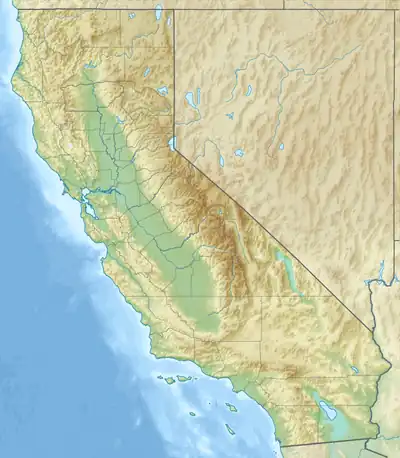| Thompson Creek Dry Creek | |
|---|---|
.jpg.webp) Paralleling Coyote Creek to the east is its tributary (via Lower Silver Creek) Thompson Creek, along San Felipe Road with Reid–Hillview Airport, Eastridge Mall, and Lake Cunningham at top, Yerba Buena Road at bottom. | |
 Location of mouth | |
| Location | |
| Country | United States |
| State | California |
| Region | Santa Cruz Counties |
| Physical characteristics | |
| Source | Edenvale Hills of |
| • location | Evergreen Valley in southeast San Jose, California |
| • coordinates | 37°15′29″N 121°42′18″W / 37.25806°N 121.70500°W[1] |
| • elevation | 1,200 ft (370 m)[1] |
| Mouth | Lower Silver Creek |
• location | Just north of Lake Cunningham in southeast San Jose, California |
• coordinates | 37°20′24″N 121°48′35″W / 37.34000°N 121.80972°W[1] |
• elevation | 123 ft (37 m)[1] |
| Length | 10.8 mi (17.4 km) |
| Basin features | |
| Tributaries | |
| • left | Remnant of Upper Silver Creek |
| • right | Yerba Buena Creek, Evergreen Creek, Fowler Creek, Quimby Creek, Norwood Creek |
Thompson Creek is a 10.8-mile-long (17.4 km)[1][2] northwestward-flowing stream currently originating on the southern slopes of Mount Misery[3] in the western foothills of the Diablo Range. It flows along San Felipe Road then through Evergreen Valley in San Jose, Santa Clara County, California where it was extended in 1970 to Lower Silver Creek. The creek was one of several that fed into the marshy area known as Laguna Socayre, where the Lake Cunningham flood retention basin is now.
History
Historically, Thompson Creek was known as Dry Creek and ran through the Rancho Socayre.[4] The etymology of the name Thompson is unclear.[5]
Watershed and course
The Thompson Creek watershed currently drains an area of approximately 18 square miles (47 km2)[6] with its source on the southern flank of Mount Misery in the western foothills of the Diablo Range southeast of San Jose, California. Upper Silver Creek and Thompson Creek both historically sank into the alluvial basin of Evergreen Valley in southeast San Jose.[7] Then they resurfaced and flowed into a large freshwater marsh known historically as Laguna Socayre, and referred to more recently as Silver Creek Marsh.[8] In the 1970s, Upper Silver Creek flows were shunted due west into a flood control channel discharging directly to Coyote Creek south of Singleton Road, although a remnant of Silver Creek flows into Thompson Creek (after the latter was extended to Silver Creek Marsh in 1970).[6][7] In 1978, Silver Creek Marsh was excavated into a flood water detention pond or reservoir, now known as Lake Cunningham.[7] Thompson Creek was routed around the west side of Lake Cunningham to the north side where it joins with Flint Creek to form the source of today's Lower Silver Creek, as indicated by the Santa Clara Valley Water District (now Valley Water).
In addition to the remnant of Upper Silver Creek being tributary to Thompson Creek, it also receives numerous tributaries which drain the east San Jose foothills of the Diablo Range. These are, heading downstream: Yerba Buena Creek, Evergreen Creek, Fowler Creek, Quimby Creek, and Norwood Creek. Historically these were not connected to Thompson Creek, and sank into the alluvial plain of east Evergreen Valley, but in the 1970s were connected to Thompson Creek as part of the East Zone Flood Project in order to provide storm drainage for urban development.[6]
Ecology and conservation
Historically Thompson Creek did not reach today's Lake Cunningham and was not regarded as a steelhead trout (Oncorhynchus mykiss) spawning stream.[6]
See also
References
- 1 2 3 4 5 U.S. Geological Survey. National Hydrography Dataset high-resolution flowline data. The National Map Archived 2012-03-29 at the Wayback Machine, accessed December 6, 2023
- ↑ U.S. Geological Survey Geographic Names Information System: Silver Creek
- ↑ "Mount Misery". Geographic Names Information System. United States Geological Survey, United States Department of the Interior.
- ↑ Robin Grossinger, Ruth Askevold, Chuck Striplen, Elise Brewster, Sarah Pearce, Kristen Larned, Lester McKee, Josh Collins (2006). Coyote Creek Watershed Historical Ecology Study: Historical Condition, Landscape Change, and Restoration Potential in the Eastern Santa Clara Valley, California (PDF) (Report). Oakland, California: San Francisco Estuary Institute. Retrieved December 6, 2023.
{{cite report}}: CS1 maint: multiple names: authors list (link) - ↑ David L. Durham (2000). Durham's Place-Names of the San Francisco Bay Area. Clovis, California: Word Dancer Press. p. 181.
- 1 2 3 4 Robert A. Leidy, Gordon S. Becker, Brett N. Harvey (2005). Historical Distribution and Current Status of Steelhead/Rainbow Trout (Oncorhynchus mykiss) in Streams of the San Francisco Estuary, California (Report). Oakland, CA: Center for Ecosystem Management and Restoration (CEMAR). Retrieved December 5, 2023.
{{cite report}}: CS1 maint: multiple names: authors list (link) - 1 2 3 Christina Keenan and Mariah McPherson (November 12, 2003). The implementation of the Lower Silver Creek watershed project (Report). Berkeley, California: UC Berkeley: Water Resources Collections and Archives. Retrieved December 6, 2023.
- ↑ Janet M. Sowers, Justin T. Pearce (February 28, 2003). Geomorphology of the Historical Silver Creek Watershed (PDF) (Report). San Jose, California: Santa Clara Valley Water District. Retrieved December 6, 2023.